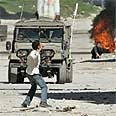
If peace conference fails 3rd intifada could erupt
צילום: רויטרס
En route to third intifada
It's up to Olmert and Abbas to prevent another cycle of violence
The spirit of Oslo is once again hovering in the air. Those formerly on the Shin Bet's wanted list are now jovially patting their persecutors on the back while smiling for the TV cameras. The Palestinians in the West Bank are once again being tempted to think that what once lay in the distant future is now just around the corner, and once again we are leading ourselves to a futile situation.
Every effort is being put into preparing the ground for the regional conference planned by the Americans in November of this year; however, it would be reasonable to assume that these efforts are destined to fail. As it may be surmised from the last two attempts – failure of the conference would signify the renewal of violence.
While the Winograd sword is hovering over his head, and criminal files are piling up in the attorney general's office, public support for Olmert amounts to very little. Under such circumstances he does not have the ability to repeat what Ariel Sharon did just two years ago – uproot settlements. To do so, strong authority and a sense of a public mandate are necessary.
What the settlement community accepted in the past as a democratic decision supported by the people will now be seen as an attempt by a failed leader to save his seat. It won't work.
Matters are more complex on the Palestinian side. Mahmoud Abbas' approval rating is not much different than Olmert's. He is considered a failed leader, hesitant and lacking charisma. Contrary to Olmert, he has already announced that he will not be running for another term in office, and the government he set up headed by Salam Fayyad is an intermediate government whose authority is limited until the next elections. His authority to relinquish the right of return and parts of Palestine is no greater than Olmert's.
The Palestinian public would reject any deal that would not meet the parameters set by his predecessor, Yasser Arafat. Abbas is aware of this and he realizes that in any other agreement he would be placing his head on the chopping block, and thus he will avoid signing an agreement that would meet the parameters expected by Israel.
Expectations should be lowered
Abbas is also highly familiar with the dynamics of expectations that a conference of this type creates, and therefore he is repeatedly warning against such a conference before reaching clear agreements on all topics.
Yet even if he finds courage thanks to the support of US and Arab leaders, and risks signing an agreement according to the parameters of an "improved Oslo," "Camp David" or the "Clinton model," as negotiation veterans have termed it, it should be noted that Abbas does not have the ability to enforce an agreement on at least half of his territory: The Gaza Strip is not under his control, and in certain areas in the West Bank as well, his reign is somewhat shaky and subject to the goodwill of the local holders of power. And the acts of destruction planned by Iran and Syria have still not been mentioned.
The entire move may collapse like a house of cards on the day of the peace conference's failure if Olmert and Abbas return empty handed, which would lead to an eruption of another wave of violence worse than the former. Yet the two are already caught up in the dynamics of the move and cannot halt it.
Under such circumstances, and in order to prevent another cycle of violence, the two leaders must take preparatory action. Firstly, they should determine limited attainable objectives – the IDF's withdrawal from most of the West Bank, building of joint economic infrastructures, and granting the Palestinians additional symbols of sovereignty such as currency (despite the lack of economic sense in doing so.)
Secondly, both sides should immediately lower expectations. The public relations apparatuses should be put into action in order to explain the difficulties facing both parties and to make clear that there is no chance of a comprehensive agreement at this stage.
Finally, grant the Palestinians hope for the future by easing restrictions now, which is of particular concern to them.










